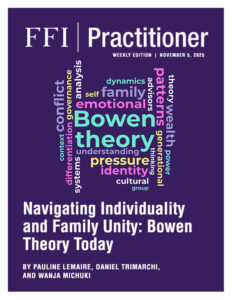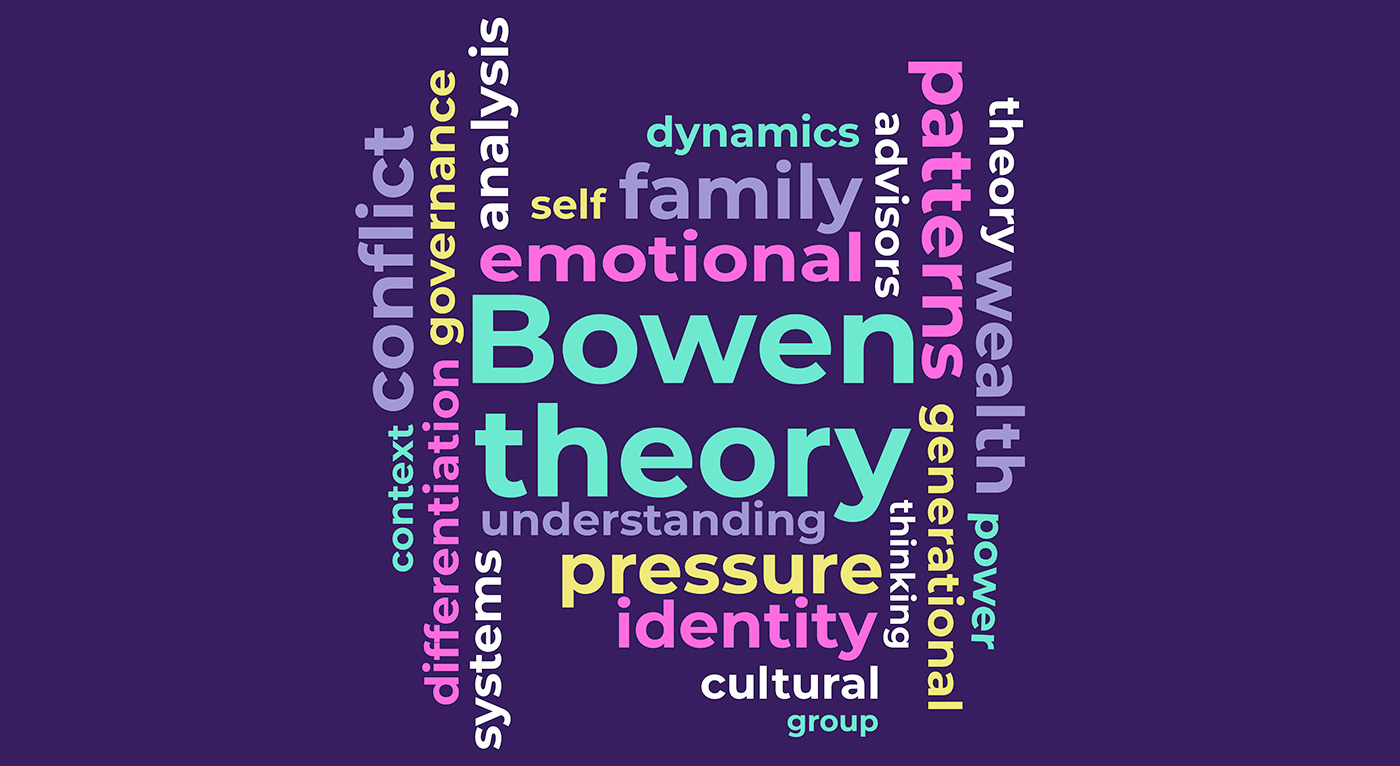
View this edition in our enhanced digital edition format with supporting visual insight and information.
Thank you to Pauline Lemaire, Daniel Trimarchi, and Wanja Michuki from the Systems Thinking Virtual Study Group for this week’s edition. This issue builds on the Systems Thinking VSG’s FFI Practitioner article, “The Inherited Bind: How Differentiation of Self and Invisible Loyalties Can Shape Family Businesses’ Succession,” further exploring Dr. Murray Bowen’s concept of the differentiation of self and its utility for family enterprise advisors.
Families are not closed units—they are open, dynamic systems shaped by culture, history, and emotional patterns across generations.
For advisors working with multigenerational families managing significant wealth, understanding families as interconnected systems is essential. In this article, the authors explore how Bowen Family Systems Theory1 and particularly the concept of differentiation of self can help advisors support families in navigating complexity, conflict, and change. This is done by reframing differentiation not as an abstract psychological ideal, but as a culturally, generationally, and systemically situated capacity—one that must be actively supported to enable inclusive and resilient family governance.
Understanding Differentiation of Self in Context
Developed by psychiatrist Dr. L. Murray Bowen, MD (1913-1990), Bowen Theory emerged in mid-20th century America, when a monogamous two-parent nuclear family was considered the social norm. The theory evolved psychoanalysis from observation of the individual to the observation of emotional patterns within families, especially how families express and manage anxiety across both nuclear and extended systems.
Central to the theory is the concept of differentiation of self, meaning the ability to maintain a strong sense of self while staying emotionally connected to one’s family, particularly when anxiety is high. It is the capacity to think and act from individual principles and intellect rather than emotional reactivity and enmeshment with the family unit.
In the context of family governance, differentiation of self is a valuable competency. Highly differentiated family members participate in inclusive and effective decision-making without over-identifying with family roles such as the scapegoat, or identity legacy narratives of the hero-founder. They can offer dissenting views constructively without destabilizing the group.
By contrast, low differentiation often manifests as:
- Over-conformity (suppressing dissent to preserve harmony)
- Emotional cut-off (distancing or rejecting family involvement)
- Triangulation (involving third parties to manage conflict)
These behaviors erode trust, complicate succession, and weaken governance structures. In our practice, we see how these dynamics play out subtly, such as next-gen leaders who avoid voicing a new strategic direction for fear of disappointing parents, or children who become the “go-between” in parental conflict.
Advisor Tip: Observe how anxiety is managed. Patterns like scapegoating, emotional distance, or triangulation signal low differentiation. Approach these dynamics with empathy and curiosity—not judgment.
The Situatedness of Differentiation of Self
In our practice, we identify three interwoven layers that influence the understanding and ability for differentiation of self: cultural norms, generational context, and one’s position in the wealth creation cycle. Viewing the family as an emotional interconnected system, open to external influences, it is essential to understand how family members are impacted not only by interpersonal family dynamics, but also the cultural zeitgeist and generational cohorts that have shaped their lives.
1. Cultural Norms
Concepts like ubuntu in sub-Saharan Africa2 or amae in Japan3 espouse mutual obligation and identity in relationship. In such contexts, the very act of differentiation of self may be seen not as a sign of maturity but of rupture.
In families shaped by colonial legacies, expressions of self may be shaped by imposed hierarchies, such as deference to authority or silence around loss and conflict. These dynamics can complicate the development of differentiation by framing autonomous thinking or emotional clarity as disloyal or disruptive.
Differentiation of self is thus a very situated process, and actions within a family are interpreted differently according to culture. A child who declines to join the family business in favor of a personal vocation might be viewed as disloyal in cultures where conformity is paramount. Advisors must be attuned to these cultural scripts—not to pathologize them, but to work within them.
Example: In working with a Japanese family who had adopted their son-in-law as CEO through mukoyōshi,4 an advisor had to examine their own European assumptions about adoption to fully understand its relational and strategic significance in this context, and to advise with cultural relevance rather than projection.
Advisor Tip: Appreciate the cultural implications. What feels like healthy individuation in one context may be interpreted as betrayal in another. Use tools to map family roots and trace cultural, generational, and historical imprints. Be cautious not to essentialize cultural traits; many families navigate hybrid cultural realities, where multiple value systems and narratives coexist and evolve.
2. Generational Context
Generational labels (Boomers, Gen X, Millennials) are heuristic tools used to understand how individuals of similar age tend to share formative experiences that shape their attitudes towards identity, authority, and change.
When applied with nuance and cultural humility, generational patterns help advisors examine how differentiation of self is interpreted differently across cohorts. The social, political, and emotional environment in which one comes of age significantly influences how one interprets the emotional work of differentiation of self.
Advisor Tip: Generations inhabit different emotional worlds. When emotional friction arises between generations, resist the impulse to diagnose immaturity or dysfunction. Instead, ask: What values shaped each generation’s understanding of connection, duty, and selfhood? Equally important for the advisor is to reflect on how his/her generational lens may unconsciously shape his/her perception of family dynamics. Differentiation is about clarity in the face of difference. The advisory role is to help coach family members to recognize generational differences as bridges for more thoughtful dialogue and mutual respect.
3. Position in the Wealth Creation Cycle
An individual’s position within the family’s wealth creation cycle often shapes their experience of power and voice, and consequently their understanding of and capacity for differentiation of self.
- Founders (G1) often hold significant decision-making authority and emotional influence.
- Sibling partnerships (G2) frequently navigate complex power dynamics, balancing respect for the founder’s legacy with the need to assert their identity and influence in a more horizontal leadership context.
- Cousin consortiums (G3 and beyond) operate in more complex, distributed systems where governance becomes more formalized and may face the paradox of both relative material privilege and diminished agency, struggling to assert meaningful differentiation within structures they neither built nor fully control.
Such dynamics are frequently observed across multigenerational enterprising families. These power asymmetries interact with generational narratives and culturally specific values around authority, loyalty, and individualism, producing diverse expressions of differentiation. Understanding differentiation through this lens shifts the focus from an individual psychological task to a situated negotiation of power and identity within evolving family dynamics.
Example: A G3 member struggled with imposter syndrome, feeling unworthy of leadership despite strong capabilities. Through coaching, he realized that differentiation was not about proving his capabilities based on the founder’s image, but about leading from his values while staying connected to the family’s purpose.
Advisor Tip: Recognize that differentiation may feel threatening or impossible when it challenges entrenched power or loyalty structures. By acknowledging these dynamics explicitly, an advisor can help clients move beyond individual struggle to engage with differentiation as a strategic, relational process embedded in family power patterns, allowing more nuanced, realistic, and transformative guidance.
From Theory to Practice: The Advisor’s Role
Differentiation of self, as articulated in Bowen Theory, is not a fixed psychological attribute but a contextually situated capacity, shaped by intersecting cultural, generational, and wealth cycle factors.
Advisors are part of the system, and therefore their posture, presence, and ability to model differentiation of self are critical. Advisors who over-identify with families, avoid conflict, or impose narrow frameworks can unintentionally reinforce dysfunction.
To that end, self-awareness is an ethical and strategic imperative. Advisors must interrogate their own emotional patterns, generational narratives, and cultural assumptions. One practical step in this process is the examination of implicit bias. Tools such as the Harvard Implicit Association Test5 provide a useful entry point for exploring these internal dynamics. While not diagnostic, such tools can prompt critical reflection on how one’s internalized schemas about authority, autonomy, or identity may reinforce or disrupt systemic patterns in family systems.
Advisors can implement the following practices to become more effective:
- Maintain principled stances without becoming reactive.
- Respect multiple perspectives without losing clarity.
- Recognize their own cultural and generational biases.
- Create space for reflection, not just resolution.
As was intended by Dr. Bowen, practicing and coaching differentiation of self requires cultural humility, generational sensitivity, and the application of systems thinking. Bearing in mind that families and societies will continue to evolve with greater complexity over time, differentiation of self must be practiced as a dialogue, not a doctrine. As families continue to evolve within increasingly pluralistic and complex social contexts, so too must the frameworks and practices of those who advise them.
References
1 The Bowen Center for the Study of the Family. “The Bowen Center for the Study of the Family.” Accessed August 25, 2025, at https://www.thebowencenter.org/.
2 Christian B. N. Glade, “What is Ubuntu? Different Interpretations among South Africans of African Descent,” South African Journal of Philosophy 31, no. 3 (2012): 486. doi:10.1080/02580136.2012.10751789
3 Takeo Doi, The Anatomy of Dependence, trans. John Bester (Kodansha International, 1981).
4 Mariko Oi, “Adult Adoptions: Keeping Japan’s Family Firms Alive,” BBC News, September 19, 2012, https://www.bbc.com/news/magazine-19505088.
5 Project Implicit. “Learn More.” Accessed August 25, 2025, at https://implicit.harvard.edu/implicit/education.html.
About the Contributors

Pauline Lemaire, ACFBA/ACFWA, is a Family Governance Advisor at Pictet, where she draws on her background in anthropology to help families develop governance frameworks that are both practical and aligned with their values. She places a strong focus on cultural sensitivity and long-term implementability. She can be reached at plemaire@pictet.com.

Daniel Trimarchi is National Leader – Family Dynamics and Governance for KPMG Australia and advises business families globally on managing complexity and change in their governance systems. With 16+ years’ experience, he helps families define their shared purpose and develop structures for decision-making and communication to achieve multi-generational success. He can be reached at dtrimarchi@kpmg.com.au.

Wanja Michuki, CFBA, ACFWA, is Managing Director of Be Bold Consulting & Advisory Ltd, a firm dedicated to coaching and advising family businesses through generational transitions. She works with business owners and families developing strategies that strengthen family business stewardship, communication, and structuring in the succession process. She can be reached at wanja@bbold.co.ke.

View this edition in our enhanced digital edition format with supporting visual insight and information.





